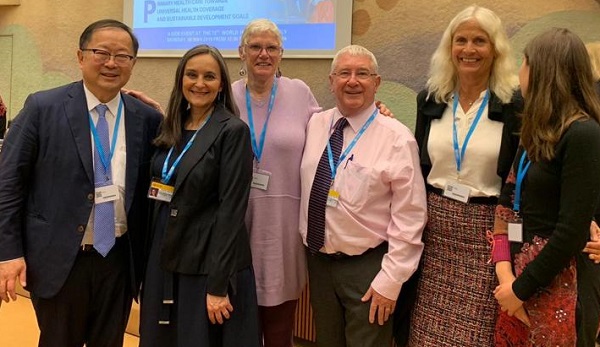From the President: November 2020

Photo: At the WHA - Donald Li, Viviana Martinez-Bianchi, Monica Burns, Garth Manning, Anna Stavdal, Ana Nunes Barata.
Español Français 中文
‘Increased influence and collaboration with WHO’.
Every poll and discussion we hold with Member Organisations about what the most important role is that WONCA can undertake on their behalf comes back with the plea to further escalate our involvement with WHO. Our members want us to use the leverage of 500,000+ members to increase visibility and recognition of family medicine.
Over the years, our involvement with WHO has grown from strength to strength. We routinely field a senior WONCA team at annual World Health Assemblies; our Working Parties and Special Interest Groups are involved with WHO at global and regional levels, in topic-specific research and deliberations; successive WONCA-WHO Liaison officers have built close and constructive ties right across the WHO spectrum. WONCA responds to multiple requests for input to WHO papers and events on a frequent basis; often with little turnaround time. We appreciate that being asked for comments and inputs by WHO reflects the growing recognition within WHO of the need for comprehensive, qualified and accessible primary care delivery, to achieve the global goal of Universal Health Coverage.
It is good that WHO now recognises the need for professional family medicine input into policies, advisory documents, educational platforms and cross cutting clinical issues. As a global organisation, WONCA is pleased to provide inputs and to gently (and sometimes not so gently) advise WHO on best practice in family medicine development and delivery of primary care. But there is a limit to what we, as a small organisation, can take on. It would be great if WONCA was a much bigger, more affluent, organisation, with human and financial resources to respond to all of the requests for inputs from WHO. Sadly, our Secretariat is not large nor are we affluent! But we value the level of influence which we have built up.
Our organisational policies, our core values, set the agenda for issues and topics on which we can offer advice and use our influence. In November 2019, our Executive debated and agreed priorities for involvement with WHO – less than a year later, the demand for WONCA input has increased exponentially. In the last month (October), there were 16 specific requests for WONCA input into issues as wide ranging as the WHO NCD Newsflash, World Mental Health Day, WHO’s PHC performance measurement and monitoring guidance, WHO’s new Learning Hub, the special session of WHO Executive Board, review of the draft pocketbook on adolescent health, and many more. Some of these requests for WONCA input had less than a 24-hour turnaround required which, in terms of times zones and availability of the relevant WONCA members, is almost impossible.
While we welcome the much-increased engagement, we have to again prioritise. Our extremely busy CEO, WONCA-WHO Liaison, Viviana Martinez Bianchi, the President and President-Elect only have 24 hours in their days. Later in November our Executive will revisit our priorities for engagement with WHO. If you have strong views on issues which WONCA should address with WHO, please let your regional Presidents know what they are and why they deserve continued involvement.
WONCA-WHO engagement at regional (and country) level is also much increased than previously. This is a great reflection of the determination of WONCA regional Presidents to make the voice of family medicine heard, especially in the context of achieving Universal Health Coverage. Delivery of robust, comprehensive primary care by qualified primary care teams is the best and most affordable way to improve the health of our nations. Engagement at regional level and at country level between WONCA and WHO reflects our shared goals and aspirations for the health of our nations and I applaud our regional presidents for their continued work in this area.
Donald Li
President